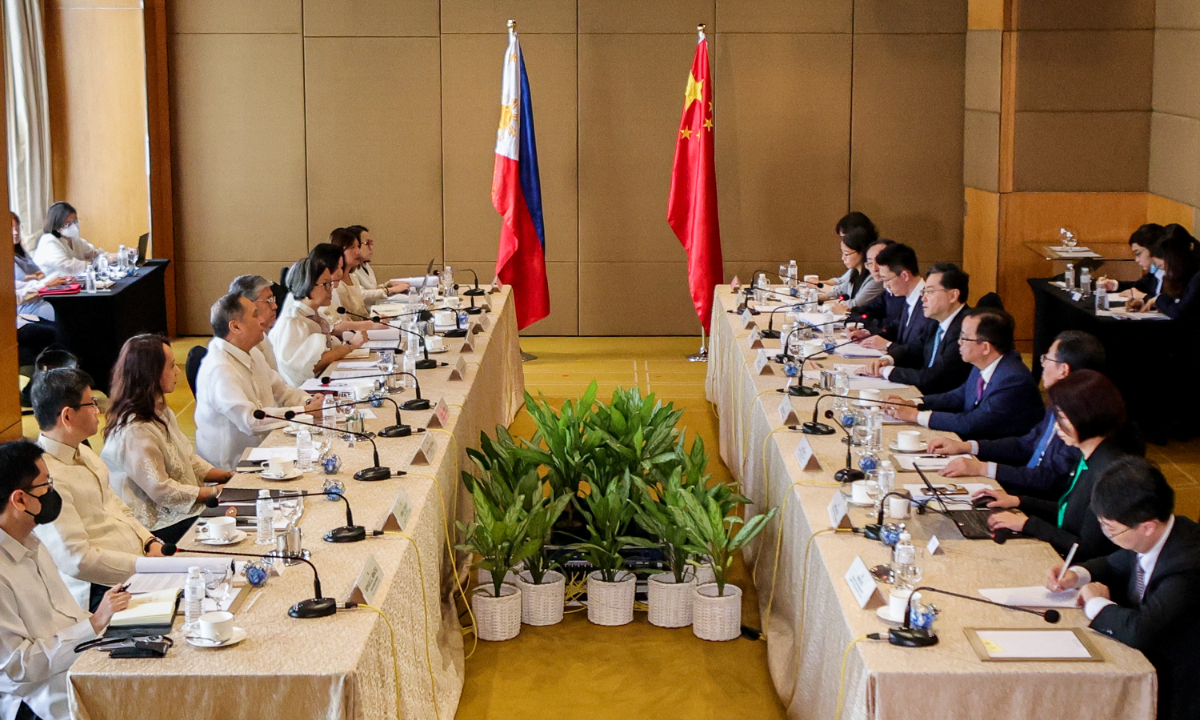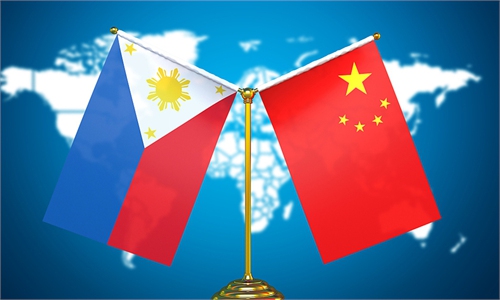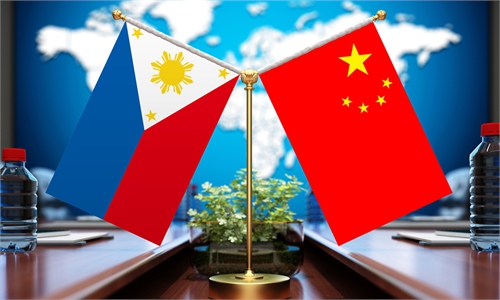China, Philippines vow to deepen ties, resolve differences amid Qin Gang's visit
Cementing common interests helps withstand US sowing discord

Chinese State Councilor and Foreign Minister Qin Gang (right center) meets with Philippine Foreign Secretary Enrique Manalo in Manila on April 22, 2023. Photo: AFP
China and the Philippines have more shared interests than differences and their disputes on the South China Sea do not form the totality of relations between the two countries - this consensus was reaffirmed and calibrated during Chinese State Councilor and Foreign Minister Qin Gang's ongoing visit to the Philippines, said analysts, calling for vigilance against the US' increasing interference.
During his meeting with Philippine President Ferdinand Marcos Jr. on Saturday, Qin Gang pointed out that he hopes that the Philippines will focus on regional peace and stability, proceed from the fundamental interests of the two peoples, properly handle Taiwan-related and maritime issues, respect China's sovereignty, security and territorial integrity, and propose to further improve the sea-related liaison mechanism to manage and control the situation.
On the second day of Qin's first official visit in his current post to the country, he met with Philippine Foreign Affairs Secretary Enrique Manalo and said that China was ready to work with the Philippines to implement a consensus between the two countries' leaders and properly resolve differences.
Enrique Manalo said that the Philippines' differences with China in the South China Sea were not the totality of relations between the two countries and "these differences should not prevent us from seeking ways of managing them effectively," Reuters reported.
Qin also met with Philippine President Ferdinand Marcos Jr. on Saturday. Qin noted during the meeting that the two sides should firmly grasp the correct direction of bilateral relations, deepen communication, enhance mutual trust, overcome difficulties, eliminate interference, create favorable conditions for advancing cooperation, and ensure that China-Philippines relations continue to develop along the healthy and stable track.
The visit by Qin, one of China's highest-ranking diplomats, showcased China's sincerity in dealing with the disputes and highlighted the great importance it has attached to relations with the Philippines. The focus of China-Philippines relations is still on cooperation despite some countries' attempts to sow discord, Xu Liping, director of the Center for Southeast Asian Studies at the Chinese Academy of Social Sciences, told the Global Times.
The three-day visit starting Friday is Qin's first to the Southeast Asian country as China's foreign minister, and has the aim of implementing the consensus reached by the top leaders during Philippine President Ferdinand Romualdez Marcos Jr's state visit to China in January, said analysts.
Calibrating ties
Qin's visit is a timely calibration of China-Philippines relations given recent noise. The remarks by Qin and the Philippines' officials showed that the two sides have also reaffirmed the consensus of not letting interference from the US disrupt China-Philippines relations and not making the Philippines a pawn for the US to contain China, Chen Xiangmiao, director of the World Navy Research Center at the National Institute for South China Sea Studies, told the Global Times.
The visit will also help to dispel misunderstanding as Qin's visit takes place while the US beefs up efforts to pull the Philippines into its small clique to contain China, and as the US stepped up efforts to bolster its military deployment in the Philippines and strengthen cooperation in the security field.
For example, the US and the Philippines are holding their largest-ever military exercises from April 11 to April 28. Moreover, the US has gained access to four new military bases in the Philippines, bringing the total number to nine, with several bases close to China's island of Taiwan.
Developing military and security cooperation with other countries is the Philippines'own affairs, and China has no intention of interfering with it. However, the US is seeking to increase its presence in the Asia-Pacific region by turning the Philippines into a pawn for its strategy, which will have a negative spillover effect on China and regional countries and destabilize the region, said observers.
Xu noted that worries over the Philippines' tilting toward the US have increased in the country, with many disagreeing with the idea of following the US in provoking China on its core interests, especially on the island of Taiwan, as these moves would push the Philippines to the dangerous frontline of fierce China-US competition, said Xu.
"The Philippine President Marcos Jr. is also aware of the necessity to keep balanced and delicate relations with both China and the US," said the expert, noting the Philippine government's recent explanation of the limits to US use of its military bases.
In response to China's concerns over US access to nine military bases in the Philippines near the Taiwan Straits and the South China Sea's waters, Philippine Foreign Affairs Secretary Enrique Manalo told Senate members during a hearing that the Philippines will not allow the US and its military forces to stockpile weapons that could be used to defend Taiwan on bases it has access to under the Enhanced Defense Cooperation Agreement (EDCA) signed in 2014, the South China Morning Post reported on April 19.
However, it should also be vigilant over the hyping of anti-China sentiment whipped up by some pro-US forces in the Philippines' politics and military, and anti-China forces in the US, especially by using disputes on the South China Sea, Chen warned, noting it is also a test for Philippine politicians to maintain clear-mind amid rising US pressure.
The US' attempt to incite confrontations in the Asia-Pacific region either by hyping the South China Sea issues or the Taiwan question or building small cliques under the pretence of cooperation will not succeed, as regional countries do not want to descend into becoming US pawns, said analysts.
During his meeting with Philippine President Ferdinand Marcos Jr. on Saturday, Qin Gang pointed out that he hopes that the Philippines will focus on regional peace and stability, proceed from the fundamental interests of the two peoples, properly handle Taiwan-related and maritime issues, respect China's sovereignty, security and territorial integrity, and propose to further improve the sea-related liaison mechanism to manage and control the situation.
On the second day of Qin's first official visit in his current post to the country, he met with Philippine Foreign Affairs Secretary Enrique Manalo and said that China was ready to work with the Philippines to implement a consensus between the two countries' leaders and properly resolve differences.
Enrique Manalo said that the Philippines' differences with China in the South China Sea were not the totality of relations between the two countries and "these differences should not prevent us from seeking ways of managing them effectively," Reuters reported.
Qin also met with Philippine President Ferdinand Marcos Jr. on Saturday. Qin noted during the meeting that the two sides should firmly grasp the correct direction of bilateral relations, deepen communication, enhance mutual trust, overcome difficulties, eliminate interference, create favorable conditions for advancing cooperation, and ensure that China-Philippines relations continue to develop along the healthy and stable track.
The visit by Qin, one of China's highest-ranking diplomats, showcased China's sincerity in dealing with the disputes and highlighted the great importance it has attached to relations with the Philippines. The focus of China-Philippines relations is still on cooperation despite some countries' attempts to sow discord, Xu Liping, director of the Center for Southeast Asian Studies at the Chinese Academy of Social Sciences, told the Global Times.
The three-day visit starting Friday is Qin's first to the Southeast Asian country as China's foreign minister, and has the aim of implementing the consensus reached by the top leaders during Philippine President Ferdinand Romualdez Marcos Jr's state visit to China in January, said analysts.
Calibrating ties
Qin's visit is a timely calibration of China-Philippines relations given recent noise. The remarks by Qin and the Philippines' officials showed that the two sides have also reaffirmed the consensus of not letting interference from the US disrupt China-Philippines relations and not making the Philippines a pawn for the US to contain China, Chen Xiangmiao, director of the World Navy Research Center at the National Institute for South China Sea Studies, told the Global Times.
The visit will also help to dispel misunderstanding as Qin's visit takes place while the US beefs up efforts to pull the Philippines into its small clique to contain China, and as the US stepped up efforts to bolster its military deployment in the Philippines and strengthen cooperation in the security field.
For example, the US and the Philippines are holding their largest-ever military exercises from April 11 to April 28. Moreover, the US has gained access to four new military bases in the Philippines, bringing the total number to nine, with several bases close to China's island of Taiwan.
Developing military and security cooperation with other countries is the Philippines'own affairs, and China has no intention of interfering with it. However, the US is seeking to increase its presence in the Asia-Pacific region by turning the Philippines into a pawn for its strategy, which will have a negative spillover effect on China and regional countries and destabilize the region, said observers.
Xu noted that worries over the Philippines' tilting toward the US have increased in the country, with many disagreeing with the idea of following the US in provoking China on its core interests, especially on the island of Taiwan, as these moves would push the Philippines to the dangerous frontline of fierce China-US competition, said Xu.
"The Philippine President Marcos Jr. is also aware of the necessity to keep balanced and delicate relations with both China and the US," said the expert, noting the Philippine government's recent explanation of the limits to US use of its military bases.
In response to China's concerns over US access to nine military bases in the Philippines near the Taiwan Straits and the South China Sea's waters, Philippine Foreign Affairs Secretary Enrique Manalo told Senate members during a hearing that the Philippines will not allow the US and its military forces to stockpile weapons that could be used to defend Taiwan on bases it has access to under the Enhanced Defense Cooperation Agreement (EDCA) signed in 2014, the South China Morning Post reported on April 19.
However, it should also be vigilant over the hyping of anti-China sentiment whipped up by some pro-US forces in the Philippines' politics and military, and anti-China forces in the US, especially by using disputes on the South China Sea, Chen warned, noting it is also a test for Philippine politicians to maintain clear-mind amid rising US pressure.
The US' attempt to incite confrontations in the Asia-Pacific region either by hyping the South China Sea issues or the Taiwan question or building small cliques under the pretence of cooperation will not succeed, as regional countries do not want to descend into becoming US pawns, said analysts.


